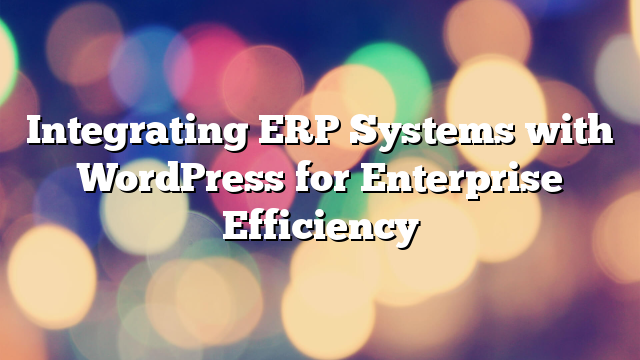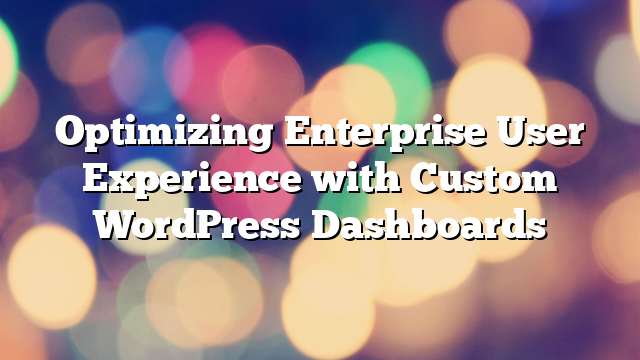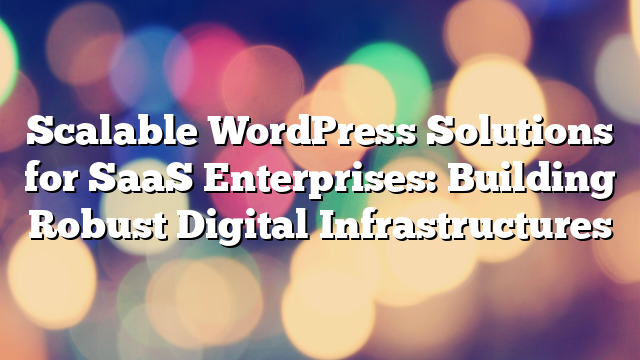Integrating Third-Party APIs in WordPress for Enterprise-Level Functionality
08.04.2025

Modern enterprise websites demand more than static pages—they require seamless data flow, real-time updates, and intelligent connectivity with external systems. That’s where API integration comes in. With its robust architecture and developer-friendly environment, WordPress is a powerful CMS for integrating third-party APIs that enhance and extend enterprise capabilities. In this article, we explore how APIs can supercharge enterprise WordPress sites and how to implement them successfully.
Why APIs Matter for Enterprise WordPress Websites
APIs (Application Programming Interfaces) allow websites to communicate with external systems—such as CRMs, ERPs, payment gateways, analytics platforms, and custom business applications. For enterprises, this enables:
- Automation of business processes
- Real-time data synchronization
- Personalized user experiences
- Secure and scalable system interactions
By integrating APIs into WordPress, enterprises can turn their websites into dynamic platforms that act as operational hubs—not just digital brochures.
Common Enterprise APIs Used with WordPress
Enterprises often rely on a range of APIs to ensure their websites support business goals. Popular integrations include:
- CRM Systems: Salesforce, HubSpot, Zoho CRM
- Marketing Tools: Mailchimp, ActiveCampaign, Marketo
- eCommerce Gateways: Stripe, PayPal, Authorize.Net
- Analytics Platforms: Google Analytics, Hotjar, Mixpanel
- Shipping & Logistics: FedEx, UPS, DHL APIs
These integrations help centralize data, improve decision-making, and enhance customer experiences directly from the website interface.
How WordPress Handles API Integration
WordPress offers multiple ways to integrate with APIs:
- WP HTTP API: Built-in functionality that enables secure HTTP requests to external services.
- Custom Plugins: Tailored plugin development allows precise control over when and how APIs interact with the site.
- REST API: WordPress’s own REST API can also be used to expose internal data to external platforms.
This flexibility allows developers to craft seamless, bidirectional integrations based on enterprise needs.
Best Practices for Secure API Integration
When working at an enterprise level, security and scalability are non-negotiable. Keep these best practices in mind:
- Use secure authentication (OAuth, API keys, JWT tokens)
- Limit exposure of sensitive data through proper endpoint permissions
- Implement caching and rate-limiting to avoid performance issues
- Log API interactions for monitoring and debugging
Following these principles ensures the integration is both efficient and safe for enterprise operations.
Real-World Example: Syncing CRM Data with WordPress
Imagine a business wants to sync user data from a WordPress registration form directly to Salesforce. This integration would:
- Capture the user’s data from the form
- Send the data via a secure API call to Salesforce
- Trigger a workflow or campaign in the CRM automatically
This is just one example of how API-powered automation can improve workflows and reduce manual effort across teams.
How Vipe Studio Helps with API Integration
At Vipe Studio, we specialize in advanced enterprise WordPress development, including custom API integrations. Whether you’re looking to connect a headless frontend, automate CRM updates, or sync your inventory in real-time, we offer:
- Custom plugin development for seamless API handling
- Performance and security optimization
- Ongoing monitoring and maintenance
- Integration with both REST and GraphQL-based APIs
Our tailored approach ensures your API-powered WordPress site is reliable, scalable, and aligned with your business objectives.
Conclusion: Connect Everything with Confidence
For enterprises, integrating third-party APIs into WordPress isn’t just a technical choice—it’s a strategic advantage. It allows businesses to automate, scale, and personalize like never before. Whether it’s marketing automation or syncing inventory, Vipe Studio is your partner for building powerful API-driven WordPress solutions. Let’s build your connected future today.



